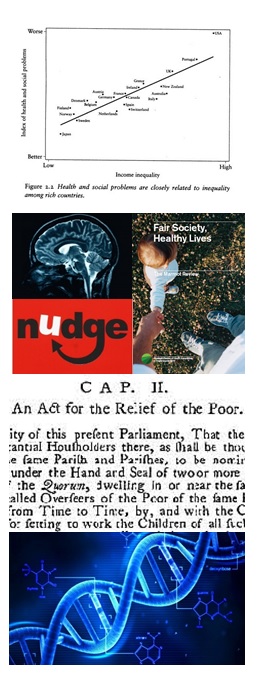St John’s Reading Group on Health Inequalities
St John’s Reading Group on Health Inequalities
About the Reading Group
The St John’s College Reading Group on Health Inequalities was established in 2014 following discussions between Professor Ann Louise Kinmonth (Fellow) and Professor Mike Kelly (Visiting Fellow). Its purpose is to bring together scholars from a range of disciplines; currently psychology, sociology, history, neuroscience, biology, epidemiology, primary care, philosophy and health services research, to consider the wider mechanisms by which inequalities in human health arise and are sustained across time and generations.
Meeting to discuss papers offered by members or guests, we study the interrelationships between social, biological, behavioural and historical factors and the processes and patterning of mortality and morbidity in populations.

Taking a historical view has emphasised the importance of time and wider events in interpreting the patterning of health. Recent developments in biology, especially epigenetics, together with new understandings in in social neuroscience, suggest that the traditional distinction between the social and the biological may be outdated. The St John’s Group explores the implications of these understandings in the context of health inequalities. In short we observe that in human societies social and historical factors have profound and direct effects on adult health and human biological, psychological and social development. In turn these factors can and do impact on the health of subsequent generations. The interaction between social and biological factors over time is an inescapable part of the explanation of the patterning of human health.
There is strong evidence that position in the social hierarchy in humans is closely related to health and risk of disease. The result is a social gradient in health—worse health the lower the social position. The question is why; how does social position affect biological pathways to cause disease and how is this sustained across generations?
The Reading Group has reviewed a number of papers and books, and subsequently a number of possible synergies between disciplines have emerged from discussions within the Reading Group.
In 2015-16 the Reading Group was supported by the St John's College Annual Fund (click here to download the end of year report) in order to deliver research outputs and to encourage closer ties with senior students in St John’s.
In 2017 we joined with the SJC Picture House, Medsoc, and Chapel for an open viewing of the highly acclaimed Ken Loach film, I Daniel Blake, using film to complement evidence in understanding inequalities in health.
In 2018 we extended our interest beyond human societies to consider what might be learned from the behaviour of, and the social structures to be found in, communities and groups of social mammals.
In 2020 the interdisciplinary workshop How Can Primary Care Prevent Health Inequalities? New Connections and Research Priorities explored primary care and the role it could play in reducing health inequalities. This led to the creation of an active interdisciplinary network of early career researchers in Cambridge who are thinking about public health and primary care and their role in addressing health inequalities. See Networks - Health Equity Network (HEN).
In 2023 we built on the 2017 Loach meeting I Daniel Blake to host a workshop, Precarious Lives: inequalities in health through the lens of the film maker, where we showed the Ken Loach film Sorry We Missed You in the context of the 1948 classic film, Bicycle Thieves.
Contact information:
If you wish to find out more about the Reading Group then please contact:
Dr Helen Watts – hw523@cam.ac.uk
Prof Ann Louise Kinmonth – alk25@medschl.cam.ac.uk
Prof Mike Kelly – mk744@medschl.cam.ac.uk